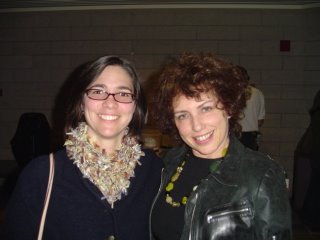
So, I get a press release! And a very cool poster, as shown above. This is very exciting. And a little terrifying, considering I still have half the lecture still to write.
Here's the PSA:
The end of history on tap at the Ship
On Tuesday evening, patrons of the Ship Pub can engage in a discussion about the end of history when Dr. Christopher Lockett presents “History's Better Angels: American Exceptionalism at the End.”
“I’m going to talk about the end of history and the way that relates to American culture,” the English professor explains. “My general argument is that American Exceptionalism—the school of thought that America is the exceptional nation, the indispensable nation—is deeply invested in the concept of history’s end.”
The concept is rooted in two opposing notions. The first, which dates back to the Puritan settlement of America and finds its base today with the religious right, is apocalyptic. “The Puritans viewed the new continent as a battleground for Armageddon,” Dr. Lockett says. “Certain sectors of the religious right still firmly believe this, that America is God’s ultimate weapon in the endgame with Satan.”
The opposing view is utopian, and supposes that history is a cumulative process that eventually arrives at its ultimate or perfect form. This isn’t a new idea, Dr. Lockett notes. The very idea that history is linear and progressive suggests an end-point. Philosophers from Hegel and Marx to such contemporary neo-conservatives like Francis Fukuyama have envisioned an acme of humanity’s social evolution.
“There’s this idea, advanced most recently by Fukuyama in The End of History and the Last Man (1992) that American-style liberal democracy is the natural end point for human development,” Dr. Lockett contends. “The flaw in this brand of exceptionalism is that if the entire world does adopt the American model, then America ceases to be exceptional.”
The question he finds most interesting, however, is the anxiety that arises over what happens at if this ending point is achieved. “There is a deep ambivalence in the writings about this, largely because of the sense that conflict and challenge leads to progress. What kind of world arises then in the absence of such difficulties?”
Dr. Lockett’s talk will employ American novelist Don DeLillo’s book Underworld (1997), which he calls a “fairly comprehensive critique of this concept,” and Walter Benjamin's figuration of "messianic time," as alternative modes of thinking these forms of history.
Lockett’s exploration of History's Better Angels gets underway at The Ship on Duckworth Street, St. John’s, at 8:30 p.m. on Tuesday, Nov. 28. Following his remarks, open discussion will be invited.


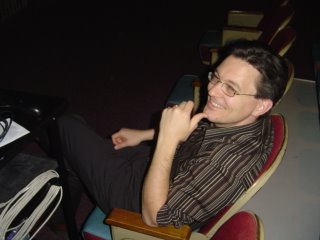
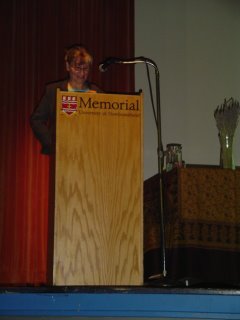 At the reception: Nancy Pedri (Lit Theory, World Lit), Don Nichol (18th Century, Textual Crit), and Don's wife Mary Walsh. Yes, THE Mary Walsh, Marg Delahunty herself of This Hour Has 22 Minutes fame.
At the reception: Nancy Pedri (Lit Theory, World Lit), Don Nichol (18th Century, Textual Crit), and Don's wife Mary Walsh. Yes, THE Mary Walsh, Marg Delahunty herself of This Hour Has 22 Minutes fame.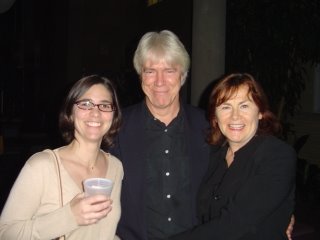 I somehow managed to cajole some of my students** into coming to the lecture. Below, Rebecca, Rex and Jonny.
I somehow managed to cajole some of my students** into coming to the lecture. Below, Rebecca, Rex and Jonny.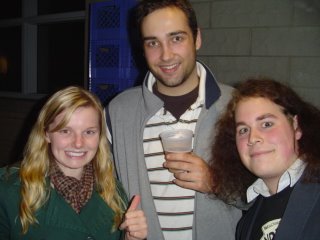 Duncan, Alana, Jill, Lauren, and Alex.
Duncan, Alana, Jill, Lauren, and Alex.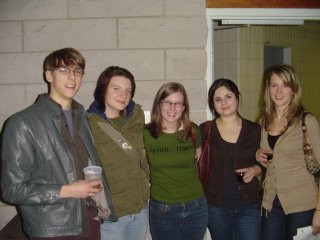 The woman of the hour, Dr. Susan Gingell, and my good friend Danine Farquharson (Contemporary Irish Lit, Lit Theory).
The woman of the hour, Dr. Susan Gingell, and my good friend Danine Farquharson (Contemporary Irish Lit, Lit Theory).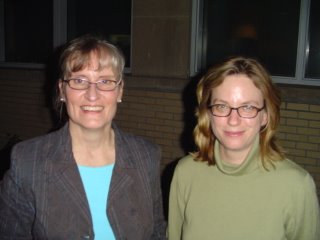 I'm with Stupid. Andrew and I are the Batman and Robin of American Literature in this department. Guess who's Robin? (Hint: I'm pointing at him).
I'm with Stupid. Andrew and I are the Batman and Robin of American Literature in this department. Guess who's Robin? (Hint: I'm pointing at him). Nancy again with the incomparable Noreen Golfman (Canadian Lit, Film Studies ... oh, and in her spare time she's the Associate Dean of Graduate Studies).
Nancy again with the incomparable Noreen Golfman (Canadian Lit, Film Studies ... oh, and in her spare time she's the Associate Dean of Graduate Studies).